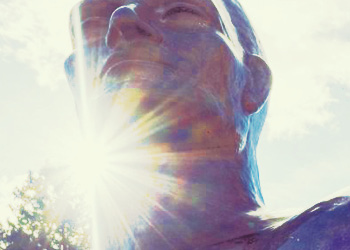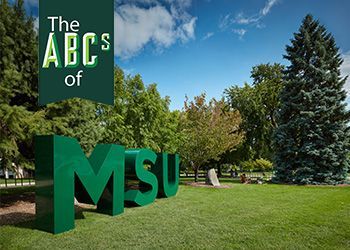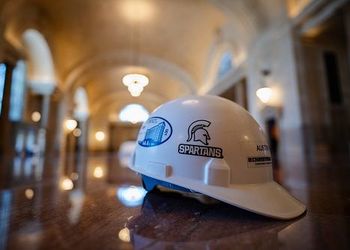Mary Ann Weaver:Putting Victory in Reach for All

Mary Ann Weaver found the Michigan Victory Games as a parent.
After her son Matthew was born with cerebral palsy, she didn’t know what to expect. How would his brain injury affect his body, or his mind? One thing she did know: Busy kids stay out of trouble.
Starting at age 8, Matthew competed in bocce ball,slalom,bowling, track-and-field and other Victory Games events. In high school, his participation earned him a varsity letter.
“I just kept parenting him and loving him and demanding what I could of him,” Weaver said, “which is what I think any of us should do to get the best life possible, whatever that looks like.”
Now 26, Matthew drives his power wheelchair to work as a programmer for IBM. And Mary Ann Weaver, of Caledonia, Michigan, serves as the volunteer president of the nonprofit Michigan Disability Sports Alliance, which runs the annual four-day Michigan Victory Games on MSU’s campus.
Weaver graduated from MSU in 1977 with a bachelor’s degree in special and elementary education. After a teaching stint, Weaver worked in insurance and consumer affairs before running the Early On program for the Van Buren Intermediate School District. That program provides services for babies and toddlers experiencing developmental delays.
Working with children with disabilities, Weaver said, is “just one of those things you’re programmed for.”
She’s been running the Victory Games for close to a decade. The role boils down to three goals, she said: recruiting more volunteers, signing on more sponsors, and especially recruiting more athletes to compete—“not because I care about growing,” Weaver said, “but because I know what it’s done for our son as well as other individuals that I’ve followed over the years.”
The games often draw comparisons to the Special Olympics. But while the Special Olympics is for athletes with cognitive disabilities, the Victory Games are for people whose primary diagnosis is a physicaldisability, although some have cognitive disabilities, too.
About 100 athletes compete every year. Most of them—as young as 7, with no upper age limit—live in Michigan and train with regional teams.
During the games, the athletes live in a residence hall with their coaches and volunteers—and away from their parents and caretakers.
It’s a chance to practice independence, which builds confidence, Weaver said—“which helps them as they grow and develop into teenagers and adults, just like anybody else.”



